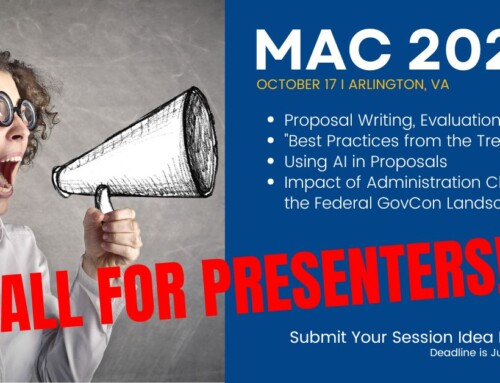Reposted from Team Patri’s blog – click here for the original article.

According to RFPIO’s 2021 Benchmark Report on Proposal Management, proposal customization to customer use cases will be the most important factor in winning proposals in 2021. Of course, proposal customization is easier said than done when dozens of proposals are in the works and due dates are fast approaching. Complicating matters, 75% of companies plan to increase submissions in 2021, while only 37% of companies plan on increasing staffing. Proposal teams are used to doing more with less. But as potential proposals increase, the ability to customize proposals necessarily decreases, potentially taking the win percentage down along with it. Lost proposals not only cost teams time that could have been spent optimizing for better-fit opportunities but also consume time and energy from contributors across the company.
As important as putting together customized proposals, then, is maintaining a strong qualification process that identifies strong opportunities and strategically passes on low probability opportunities. A strong qualification process saves time and money across the company and enables proposal teams to capture a higher percentage of opportunities by creating powerful, customized responses based on prospects’ specific use cases.
What is your company’s qualification process and how well is it working to optimize the opportunities your company is pursuing? Below, we discuss the six most important questions to ask yourself and your team as you design and refine your proposal qualification process.
Q1. WHAT IS YOUR DECISION PROCESS?
This is a simple question but can often be overlooked: What is your decision process? Is it written down? Can anyone in the company locate it and understand it?
A clear, documented decision process should be the number one priority for any proposal team or function. If you don’t have one, start by diagramming, to the best of your ability, how a proposal travels through the company and how momentum is gained to pursue a bid. The following questions will help to further refine and revise your decision process.
Q2. DO YOU HAVE A CLEAR DECISION-MAKER?
The best decision processes have a clear and definitive decision-maker or a council of decision-makers with a defined process for how a final decision is made. Without a clear decision point, time and company resources can be wasted rushing into an opportunity only for it to be nixed later. Alternatively, precious time can be wasted as a proposal bounces around the company waiting for a final decision. Make sure that any point of decision is well defined and constitutes a final verdict.
Q3. IS THE RIGHT PERSON MAKING DECISIONS?

What are the structural incentives for the decision-makers in your process? Are they compensated based solely on revenue or are they compensated for broader company health metrics like profitability or efficiency?
If your company is pursuing too many poorly qualified opportunities, it might be time to reconsider who is responsible for making proposal decisions. For instance, if your decision-maker is a sales manager, consider creating a decision council that includes a member of the finance team and a manager of the SMEs, who can help provide more visibility and responsibility to broader metrics of company health. Alternatively, if you would like a single person to be the decision-maker, consider who in the company has visibility into and responsibility for the holistic health of the company rather than just revenue.
Of course, shifting the point of decision is a political exercise that requires tact and careful planning. Most often, decision-makers are higher-up in the company and are reticent to lose their position in the process. Before shifting the process, build your case for why a more efficient process is needed and how it will benefit each aspect of the company’s operations.
Q4. WHO IS SCOPING POTENTIAL OPPORTUNITIES?
Proposal teams are often understaffed and overworked. With proposal deadlines lurking, proposal teams can sometimes overfocus on current proposals in progress and delegate scoping responsibilities to the sales team or to SMEs. This approach, while logical, can be a costly miscalculation that makes the week more manageable but the upcoming month more difficult. Even though it takes away time from completing the urgent proposal in progress, proposal teams should always be involved in scoping potential opportunities. Think of it this way: 2 hours of strong qualification can save 20+ hours in response time. Proposal teams should proactively scope opportunities and communicate their opinions to decision-makers to help inform the final decision.
Q5. WHAT STATISTICS AND METRICS ARE YOU PRESENTING TO DECISION-MAKERS?
Decision-makers in a proposal qualification process are making consequential decisions based on limited information. They may receive an opinion from sales professionals, proposal professionals, and SMEs on the fit of a potential proposal and its importance to the company. Help decision-makers make more informed qualification decisions by presenting them with the proper statistics and metrics to allow them to see the impact the decision will have not only on revenue but on overall company health and efficiency.
Metrics that should be presented to decision-makers include: opportunity fit score (how well does the proposal align with the company’s offerings), expected win %, the opportunity cost of preparing the proposal, and expected profitability metrics. For more information on how to compile the above metrics, visit our recent article, “How to Leverage Data to Make Better Pursuit Decisions.”
Q6. HOW ARE YOU COMMUNICATING GO/NO-GO DECISIONS TO THE TEAM?
A strong qualification process will mean companies can better spend their time capturing strong opportunities and save money, time, and energy by not pursuing poor-fit opportunities. While this makes the company healthier, not all parties benefit from no-go decisions. In particular, sales professionals, whose compensation relies on revenue capture, are often disappointed by no-go decisions. For this reason, it’s incredibly important to have a well-defined process that makes transparent how decisions are made.
Moreover, communicating no-go decisions to the team is an important art that can help soothe interdepartmental tensions. When communicating no-go decisions, it’s important to be thorough in identifying the reasons the proposal didn’t fit the qualification process, bolster the decision by citing the data and metrics that informed decision makers’ opinions, and give credit to the sales professional for their work in cultivating the relationship that led to identifying the potential proposal. Try to call the sales professional to break the news to them individually before sending broader communications. Be prepared to explain why the decision will only help improve company health but will ultimately free up both the sales professional and the proposal team to spend time pursuing higher-value opportunities.
WRAPPING IT UP
Well-designed qualification processes are crucial to any proposal team’s success. Without them, too many bad-fit opportunities are pursued, sapping time, energy, and money away from higher-value opportunities and initiatives. A well-designed qualification process should be clear and transparent, designate decision-makers that have proper incentives, allow proposal teams to scope and provide input on proposal fit, and feature data and metrics that represent efficiency and overall company health. When a decision is finalized, it should be communicated to the team in a way that emphasizes the thoroughness of the qualification process and the company-wide benefit of strong qualification and strategic proposal pursuit. While every company has its own organizational structure and politics to navigate, asking yourself these six questions will help you and your team design, refine, and revise a qualification process that will help your company pursue the most strategic proposal opportunities.






Leave A Comment